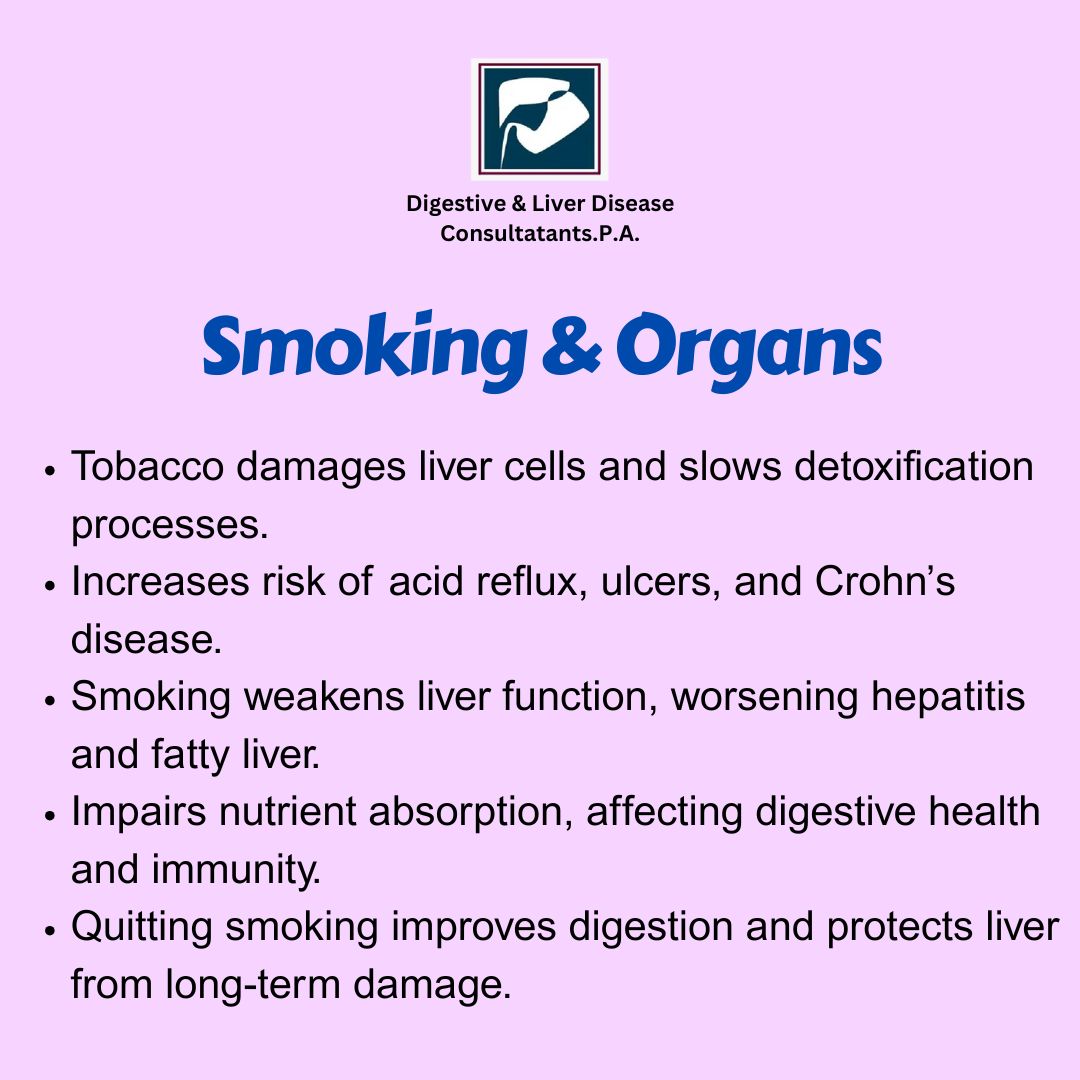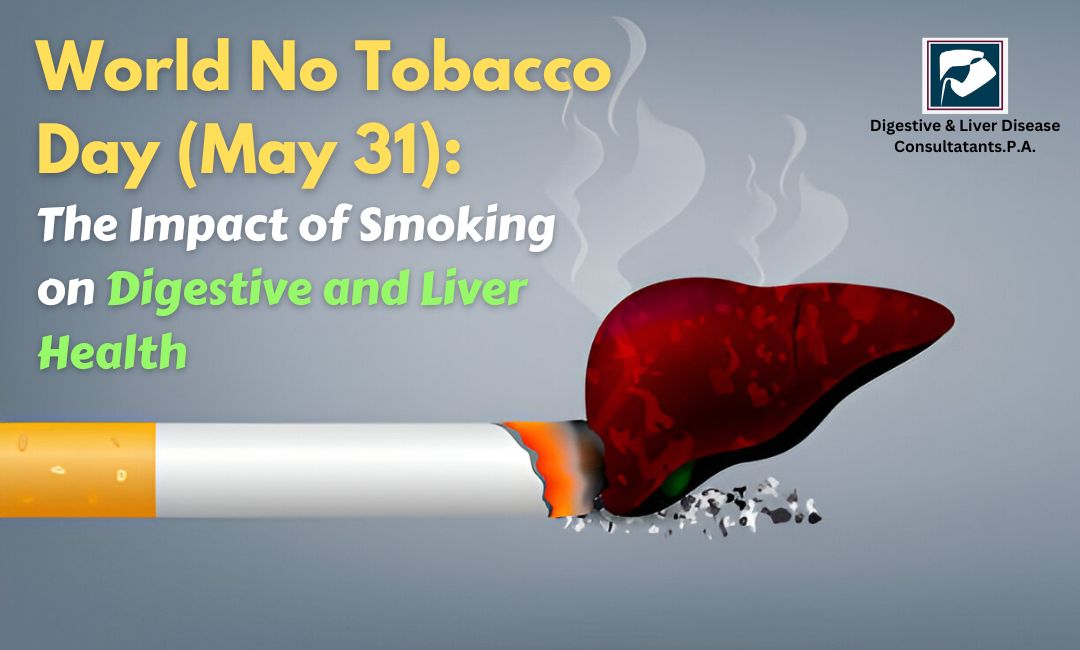Every year on May 31st, we observe World No Tobacco Day, a global initiative by the World Health Organization (WHO) to raise awareness about the harmful effects of tobacco use. While most people know that smoking damages the lungs and heart, many are unaware of the serious impact it can have on the digestive system and liver health. At Digestive & Liver Disease Consultants, P.A., we want to help you understand how quitting smoking can greatly improve your digestive and liver function.
Let’s take a closer look at how tobacco harms these vital systems—and what you can do to protect your health.
How Smoking Affects the Digestive System
Your digestive system is responsible for breaking down food, absorbing nutrients, and removing waste from the body. Smoking interferes with these processes in many ways:
1. Increases Acid Production and Heartburn
Smoking stimulates the production of stomach acid and relaxes the lower esophageal sphincter—the muscle that prevents acid from flowing backward into the esophagus. This leads to acid reflux and heartburn, which can become chronic and painful over time.
2. Raises the Risk of Peptic Ulcers
Peptic ulcers are open sores that develop in the lining of the stomach or small intestine. Smoking increases stomach acid and reduces the stomach's ability to protect itself, making ulcers more likely. It also slows healing and increases the risk of complications like bleeding.

3. Reduces Nutrient Absorption
Smoking affects how your body absorbs important nutrients, such as calcium, vitamin C, and B vitamins. Over time, this can lead to nutritional deficiencies, which weaken the immune system and impair digestive health.
4. Increases Risk of Crohn’s Disease
Studies show that smokers are more likely to develop Crohn’s disease, a chronic inflammatory bowel disease. Smoking worsens symptoms, increases flare-ups, and may reduce the effectiveness of treatment. It can also increase the risk of complications like bowel perforation and surgery.
5. Delays Healing After GI Surgery
If you need surgery for a digestive condition, smoking can delay your recovery. It slows blood flow, reduces oxygen supply to tissues, and increases the risk of infections and complications after procedures like colon surgery or endoscopy.
The Liver and Smoking: A Dangerous Combo
Your liver is a vital organ that helps detoxify harmful substances, store energy, and produce bile to aid digestion. It plays a key role in keeping your body healthy. Smoking can damage the liver in multiple ways:
1. Worsens Liver Inflammation and Fatty Liver Disease
Smoking introduces harmful chemicals like nicotine and carbon monoxide into the bloodstream, increasing oxidative stress and inflammation in the liver. These effects are especially dangerous for people with nonalcoholic fatty liver disease (NAFLD) or alcohol-related liver disease, as smoking speeds up liver damage and fibrosis (scarring).
2. Increases the Risk of Liver Cancer
Smokers have a significantly higher risk of developing liver cancer. Tobacco smoke contains more than 70 known carcinogens, many of which can reach the liver and promote cancerous changes in liver cells.
3. Interferes with Liver Function and Drug Metabolism
Your liver is responsible for breaking down medications and removing toxins. Smoking can interfere with how the liver processes drugs, which may make medications less effective or increase the risk of side effects. It also puts added stress on liver detoxification pathways.
Secondhand Smoke: A Hidden Threat
Even if you don’t smoke yourself, secondhand smoke can still harm your digestive and liver health. Inhaling smoke from others may increase your risk of GI problems, liver damage, and even cancer. Protecting yourself and your loved ones from secondhand smoke is just as important as quitting smoking yourself.
Why Quitting Smoking Improves Digestive and Liver Health
The good news is that quitting smoking can quickly lead to health improvements:
- Within days, stomach acid levels return to normal, reducing the risk of heartburn and ulcers.
- Within weeks, circulation improves, supporting liver detoxification and gut healing.
- Within months, your risk of inflammatory bowel conditions and liver disease complications starts to decline.
- Over time, the risk of liver cancer drops, and liver function can stabilize or improve.
Quitting smoking not only helps your lungs and heart—it can also add years to your life by protecting your digestive and liver systems.
How Digestive & Liver Disease Consultants, P.A. Can Help
At Digestive & Liver Disease Consultants, P.A., we provide expert care for a wide range of gastrointestinal and liver conditions. Our board-certified specialists are committed to improving the health and well-being of our patients in a supportive, compassionate environment.
We understand the challenges of quitting smoking—especially if you’re already dealing with digestive or liver issues. That’s why we work closely with you to create a personalized treatment plan that includes:
- Evaluation and diagnosis of smoking-related digestive or liver conditions
- Nutritional guidance and lifestyle counseling
- Medication management and monitoring
- Support in managing conditions like GERD, Crohn’s disease, fatty liver, and hepatitis
- Referrals to smoking cessation programs and behavioral health support
Our goal is to empower you to take control of your health—and quitting smoking is one of the best steps you can take.
Conclusion
On this World No Tobacco Day, take a moment to think about your digestive and liver health. Smoking doesn’t just harm your lungs—it affects every part of your body, especially your gut and liver. From increasing your risk of acid reflux and ulcers to accelerating liver disease and cancer, the impact of smoking is serious—but it’s also reversible.
Facing digestive issues, liver symptoms, or need to quit smoking? Book a visit with Digestive & Liver Disease Consultants, P.A. for expert care and a healthier, smoke-free life.






